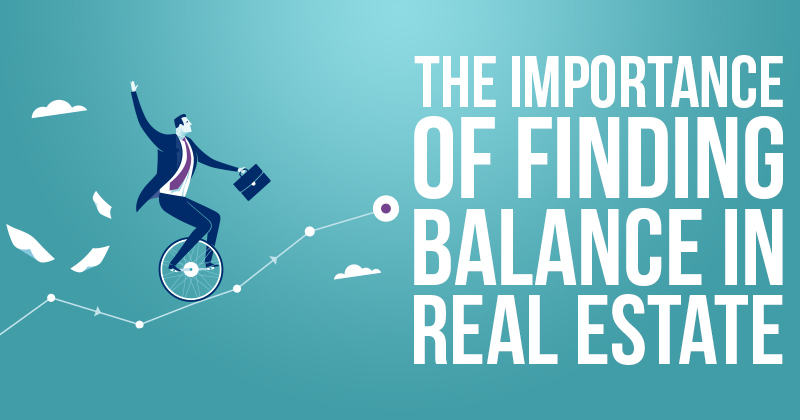Real estate is a demanding business. It requires you to be on call at all times and often to work nights and weekends. It's not surprising that many agents get burned out and ultimately decide to pursue another path.
If you don’t have a healthy work-life balance in real estate, it can actually hinder your performance.
It doesn’t matter how much you love real estate and that you don't mind working weekends or late into the night. It’s been proven that people who lack the proper work-life balance are less productive than those who keep their careers in check.
Studies have shown that working more than 50 hours per week dramatically affects performance. These studies have also shown that working too many days without a day off has the same effect.
Working too much puts stress on your mind and body. That stress can bleed into your work life in various ways. For one, it hinders your time management skills. When you have too much work to do and not enough time to do it, the quality of your work suffers. You rush through tasks that you should be taking care to complete.
It will affect your focus and cause you to fail to stay on task effectively. People that work so much to the point of stress are extremely forgetful. If your mind is cluttered, you can’t possibly do your best work. This also puts strains on your relationships with clients and co-workers.
Here are some tips on balancing your personal and professional life as an agent.
Have reasonable expectations, and set attainable goals.
Maintaining balance has a lot to do with the expectations you set for yourself. I'm not saying you shouldn't set your bar high. But if you put too much on your plate and put pressure on yourself to achieve it all, you might want to dial it back.
Let's say you set a goal of 200 cold calls a week. Is that goal really going to make a positive impact on your business? Would you be better off finding an easier, but more effective, prospecting tactic? Overworking often happens when we aren't working smart.
Prioritize which goals and tasks will do the greatest amount of good for your business. We recommend a technique called warm calling over traditional cold calling.
What is warm calling? Warm calling involves sending or giving your leads something of value before you call in order to establish a connection and gain respect. This can be a helpful book, pamphlet or home value report, an offer for free real estate photos, etc.
Working while tired and burnt out can be just as unproductive as not working at all. Essentially, it’s a waste of your time. Managing your clients or going on listing presentations aren’t what we are talking about here. It’s everything else that you set out to do each given week.
Set aside two days off each week.
Agents often end up working seven days a week pretty frequently. Even if you aren’t working a full eight hours each of those days, dealing with and thinking about work every day of the week will still wear you out. Your mind needs a break.
Your days off don't have to fall on the weekend, since you'll probably need those days for open houses and showings. Coworkers and clients will understand if you aren’t working during the week because you have presentations on a Sunday and plan on working eight hours then. When you are off, use your time right. Don’t go into the office (unless you can’t avoid it), and don’t answer any calls or emails unless it absolutely can’t wait.
Take some breaks during your work days.
Working 5 hours in a row or longer without a break is not constructive. You need to take a break to reset during the day. That means you should take at least a half hour with no interruptions — no taking calls and answering emails. Take a full break with no real estate business.
If you're on a break but answering your phone for work, you aren't really taking a break. One of the benefits of being a Realtor is that you make your own schedule. Taking 15- to 30-minute breaks in the mornings and afternoons, or a full hour lunch break relaxes your mind and improves your productivity throughout the day.
Your breaks don’t need to be at set times — all that matters is that they happen. Setting aside time to exercise, take your kids to or from school, or go out to lunch is a great way to briefly take your mind off real estate.
End your work day at the same time each day.
The best way to find balance is by taking control of your time. If you allow clients to run your day, you won't be able to control when it will end. If you set boundaries on times you're available, this won’t happen.
When you first meet them, tell them you don’t return calls or emails after 5 or 6 or whenever you prefer to be done working for the day. Say you’ll return calls during the week within 24 hours. They have jobs, so they’ll completely understand.
Put your phone on do not disturb if you're tempted to answer calls or emails on your off days.
Your phone has this easy-to-use setting for a reason. So many people (not just Realtors), say they won’t think about work on their day off, but end up looking at emails, or making non-urgent calls.
Now, obviously, you can't use this feature all the time. Aspects of your job are urgent, and you need to be reachable when you're juggling lots of clients and trying to close deals. But if you know you aren't in the midst of a make-or-break situation, it's OK to power down for a few hours.
Don’t keep your phone on DND the whole day or weekend; just choose to do so for certain periods where you really need to relax and get away from work.
The best part is you can customize certain contacts that can call or text you when DND is on. So if you want to stay in touch with family and friends — or a really demanding client — this is perfect.
Find a hobby outside of real estate.
Even if real estate is your passion, you still need something else to let that passion breathe from time to time. Find something that has absolutely nothing to do with your job.
You’ll feel like you are always working if real estate stays on your mind through your days off or even during your breaks during the day. This is a way to ensure it won’t.
Plan vacations way ahead of time.
So many agents talk about going on a weekend trip or even eventually take a week off for a long break, but most don’t get around to actually going. The way to avoid this happening is to book and plan your vacations months and months in advance.
This way, you can’t back out or get bogged down in work when the time comes. If you purchase airline tickets or event tickets, you’ve already invested your time in this vacation. Everyone needs time away from work to stay productive, and not just at home on the weekends.
When you plan trips far in advance, you can also alert any clients or potential clients to your plans and let them know you'll be out of touch.






